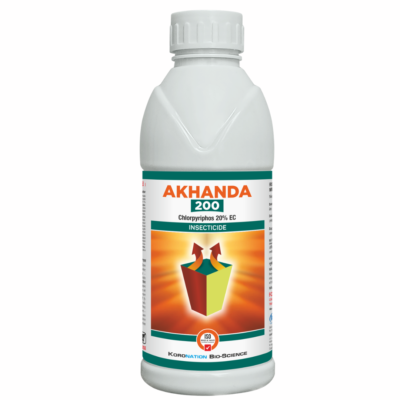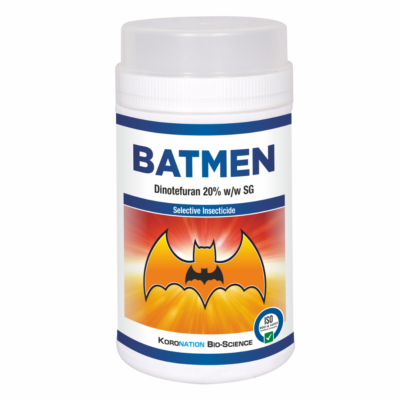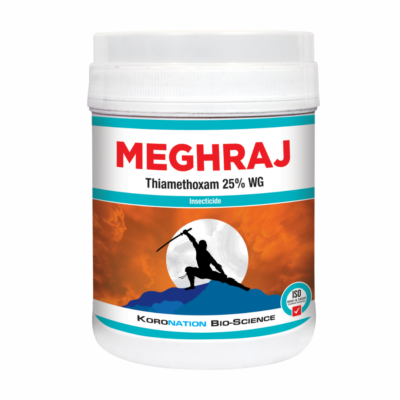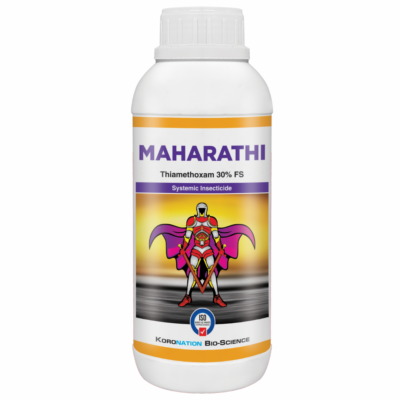Chemical Composition:
| S.No | Ingredient | Description | Weight |
| 1 | Ethion Tech. (Based on 92% w/w a.i.) | 54.50 % w/w | |
| 2 | Emulsifiers (Blend of Anionic and non ionic Calcium Alkylaryl sulphonate & Polyoxyethelene ether) | 7.00 % w/w | |
| 3 | Xylene | 38.50 % w/w | |
| Total | 100 % w/w | ||
Recommendation
|
Crop(s) |
Common Name of Pest |
Dosage/HA |
Dilution in Water in water (Ltr) |
Waiting Period between last spray to harvest (days) |
Re-entry after each Application (In Hours) |
|
|
AI (gm) |
Formulation (ml) |
|||||
| Buildings (Pre & Post construction treatment) | Termite | 0.5% | 10ml./Ltr. | IS.6313- 1981 | as per part (II & III) | |
| chilli | Mites & Thrips | 750-1000 | 1500-2000 | 500-1000 | 05 | |
| Cotton | Whiteflies | 750-1000 | 1500-2000 | 500-1000 | – | |
| Bollworms | 1000 | 2000 | 500-1000 | 25 | ||
| Gram | Pod borer | 500-7500 | 1000-1500 | 500-1000 | 21 | |
| Pigeon Pea | Pod borer | 500-7500 | 1000-1500 | 500-1000 | 21 | |
| Soybean | Gurdle beetle, Stem fly | 750 | 1500 | 500-1000 | 30 | |
| Tea | Scarlet mite, Purple mite,Red spider mite, Aphid, Helopeltis , Caterpillar ,Thrips , Pink mite | 250 | 500 | 500-1000 | 3 | |
| Purple mite | 250 | 500 | 500-1000 | * | ||
| Red spider mite | 250 | 500 | 500-1000 | * | ||
| Helopeltis | 250 | 500 | 500-1000 | * | ||
| Aphid | 250 | 500 | 500-1000 | * | ||
| Caterpillar | 250 | 500 | 500-1000 | * | ||
| Thrips | 250 | 500 | 500-1000 | * | ||
Direction of Us
P.P. Equipment:- Knapsack sprayer, footsprayer, compression knapsack sprayer, compression knapsack battery sprayer and ASPEE-HTP power sprayer. Recommendation for termites control in buildings: For protecting building from termites attack, use Ethion 50% EC at 0.5% a.i. conc. i.e. 50 ml of formulation to be diluted in 5 litres of water as per BIS standard IS:6313-1981 (Part-II) for pre-construction and IS:6313 (Part-III) for post construction treatment. i). Pre-construction Soil treatment: The chemical shall be applied uniformly at the prescribed rate in all the stage of the treatment. A suitable hand operated compressed air sprayer or watering CAN should be used to facilitate uniform disposal of the chemical emulsion. Treatment for Masonry Foundations and basements: The bottom surface and the sides (up to a height of 300 mm) of the excavations made from masonry foundations and basement shall be treated with the chemical at the rate of 5 litre/m2 surface area. After masonry foundations and the retaining wall of the basements come up, the backfill in immediate contact with the foundation structure shall be treated at the rate of 7.5 litre/m2 of the vertical surface of the sub structure for each side. Treatment for RCC foundation and basement: The treatment shall start at a depth of 500 mm below the ground level at the rate of 7.5 litre/m2 ii) Post Construction: Treatment along outside of foundation : The soil in contact with the external wall of the building shall be treated with the chemical at the rate of 7.5 litre/m2 , of the vertical surface of the sub-structure to a depth of 300 mm. Chemical emulsion shall be directed towards the wall at 1.75 litres per running metre of channel, concrete masonry apron around the building & RCC foundation to 300 mm depth from the ground level.
Treatment of soil under floors: Chemical treatment should be provided within the plinth area on the ground floor of the structure wherever such cracks are noticed, by drilling vertically 12mm holes at the junctions of floors and walls, constructional area and expansion joints at 300 mm interval to reach the soil below.
Time of Application
Foliar spray immediately after plucking.
Precaution:
- Keep away from foodstuffs, empty foodstuff containers and animals food.
- Avoid contact with mouth, eyes and skin.
- Avoid inhalation the spray mist. Spray in the direction of wind.
- Wash thoroughly the contaminated clothes and parts of the body after spraying.
- In case of any spillage on the body, it should be washed with plenty of water.
- Do not smoke, drink, eat and chew anything while spraying.
- Wear full protective clothing while mixing and spraying.
Symptoms Of Poisoning:
Headache, giddiness, vertigo,nausea, vomiting, blurred vision, diarrhoea, convulsions, sweating, excessive lacrimation, and salivation may occur.
First Aid
- If swallowed, do not induce vomiting or give liquid orallyl.
- If clothing and skin are contaminated, remove the clothes and wash the contaminated skin with copious amount of soap and water.
- If eyes are contaminated, flush with plenty of saline/clean water for about 10 to 15 minutes.
- If inhaled, remove the patient to fresh air.
Phytotoxicity
The product is not phytotoxic when used as per field recommendation.
Antidote
- Atropinize the patient immediately and maintain full atropinization by repeated doses of 2 to 4 mg. of atropine sulphate intravenously at 5 to 10 minutes interval. As much as 25 to 50 mg. of atropine may be required in a day. The need for further atropine administration is guided by the continuance of symptoms. Extent of salivation is a useful criterion for dose adjustment. 2. Dissolve 1-2 gm of 2 PAM in 10 ml distilled water and inject intravenously very slowly for 10-15 minutes.
Disposal Of Used Container
-
- It shall be the duty of manufactures formulators and operator to dispose packages or surplus materials and washings from the machine and container shall be disposed off in a safe manner so as to prevent environmental and pollution.
- The used packages shall not be left outside to prevent their re-use.
- Packages shall be broken and burried away from habitation.
Storage Conditions
The packages containing the insecticide shall be stored in separate rooms or premises away from the rooms or premises used for storing other articles particularly articles of or shall be kept in separate almirahs under lock and key depend upon the quantity and nature of the insecticide.
The rooms or premise meant forstoring the insecticide shall be well built, dry well-lit and ventilated and of sufficient dimensions







There are no reviews yet.